What's The Best Merv Rating For Air Filters
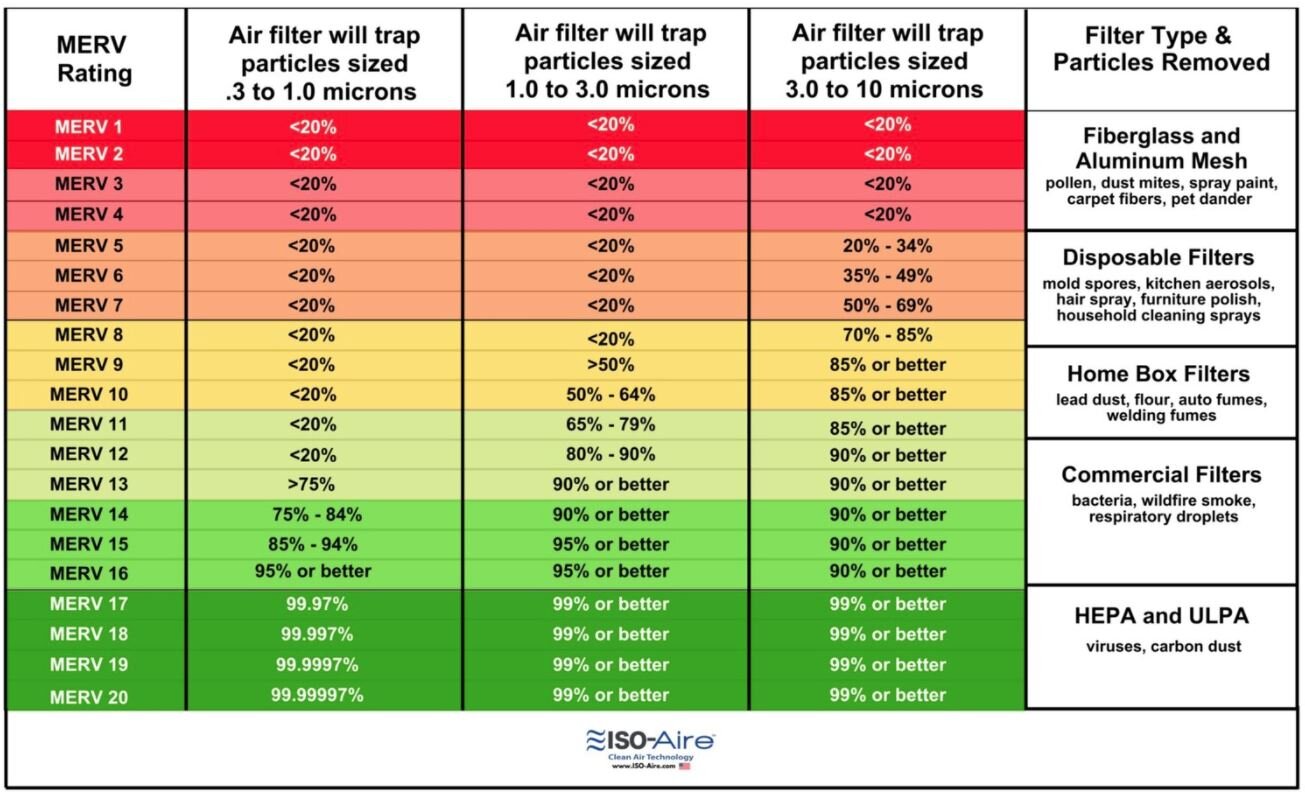
Choosing the right air filter for your home's HVAC (Heating, Ventilation, and Air Conditioning) system can feel overwhelming. One of the most important factors to consider is the filter's MERV rating, but what exactly does that mean, and which rating is best for your needs? This guide will break down the concept of MERV ratings in a clear and accessible way, helping you make an informed decision for a cleaner, healthier, and more efficient home.
Understanding MERV Ratings
MERV stands for Minimum Efficiency Reporting Value. It's a standardized scale used to measure the effectiveness of air filters in capturing particles from the air. The MERV rating ranges from 1 to 20, with a higher number indicating a greater ability to trap smaller particles.
What Do MERV Ratings Measure?
Think of your air filter as a net. The MERV rating essentially tells you how fine that net is. A lower MERV rating has larger holes, capturing only larger particles. A higher MERV rating has smaller holes, capable of trapping even microscopic particles.
Specifically, MERV ratings are determined by how well a filter captures particles of different sizes, measured in microns (millionths of a meter). Here's a simplified breakdown of what different MERV ratings typically filter:
- MERV 1-4: These filters primarily capture large particles like dust, pollen, dust mites, and carpet fibers. They offer minimal filtration.
- MERV 5-8: These filters are more effective at capturing larger particles and can also trap mold spores. They're a common choice for standard residential use.
- MERV 9-12: These filters start to capture smaller particles like fine dust, smog, and some bacteria. They're often used in higher-end residential and commercial settings.
- MERV 13-16: These filters can capture even smaller particles, including viruses, tobacco smoke, and allergens. They are often used in hospitals and other environments where air quality is critical.
- MERV 17-20: These are high-efficiency particulate air (HEPA) filters and are used in specialized applications, such as cleanrooms and surgical suites.
Why MERV Rating Matters
The MERV rating you choose directly impacts both the air quality in your home and the performance of your HVAC system.
Improved Air Quality
A higher MERV rating can significantly improve the air quality in your home by removing more airborne particles. This is especially important for individuals with allergies, asthma, or other respiratory sensitivities. By trapping allergens like pollen and dust mites, and irritants like smoke and smog, a higher-rated filter can reduce symptoms and create a healthier living environment.
HVAC System Efficiency
While a higher MERV rating offers better filtration, it can also restrict airflow. Think of trying to breathe through a very thick cloth. The tighter the weave (higher MERV rating), the harder your HVAC system has to work to circulate air. This increased strain can lead to:
- Reduced airflow: This can result in uneven heating and cooling throughout your home.
- Increased energy consumption: Your HVAC system has to work harder to maintain the desired temperature, leading to higher energy bills.
- System strain: The increased workload can shorten the lifespan of your HVAC system and potentially lead to costly repairs.
Choosing the Right MERV Rating for Your Home
The "best" MERV rating isn't a one-size-fits-all answer. It depends on several factors, including your individual needs, the type of HVAC system you have, and your budget.
Factors to Consider:
- Allergies and Respiratory Issues: If you or someone in your household suffers from allergies or asthma, a higher MERV rating (9-12 or even 13-16) may be beneficial.
- Pets: Pets can contribute to indoor air pollution with dander. A MERV rating of 8-11 can help capture pet dander effectively.
- Smoking: If there are smokers in your home, a higher MERV rating (11-13) can help remove smoke particles from the air.
- HVAC System Compatibility: Check your HVAC system's manual or consult with an HVAC professional to determine the recommended MERV rating for your system. Using a filter with too high a MERV rating can damage your system.
- Filter Thickness: Thicker filters generally have more surface area for capturing particles, allowing for higher MERV ratings without significantly restricting airflow.
- Air Filter Replacement Frequency: Regardless of the MERV rating, it's crucial to replace your air filter regularly. A dirty filter is less effective and can strain your HVAC system.
General Recommendations:
- Standard Residential Use: A MERV rating of 8 is a good starting point for most homes. It provides a balance between filtration and airflow.
- Enhanced Filtration: If you're concerned about allergies or air quality, consider a MERV rating of 11 or 13.
- Consult an HVAC Professional: If you're unsure about which MERV rating is best for your system, consult with a qualified HVAC technician. They can assess your specific needs and recommend the appropriate filter.
Debunking MERV Rating Myths
There are several common misconceptions about MERV ratings. Let's address a few:
- Myth: Higher MERV rating is always better. Reality: A higher MERV rating is not always better. If your HVAC system isn't designed for it, a high-MERV filter can restrict airflow and damage your system.
- Myth: MERV ratings are the only factor to consider. Reality: Filter thickness, material, and construction also play a role in performance.
- Myth: A cheap filter is just as good as an expensive one. Reality: Cheaper filters often have lower MERV ratings than advertised and may not be as durable.
Air Filter Types Beyond MERV Ratings
While MERV rating is critical, it's helpful to understand the different types of air filters available:
- Fiberglass Filters: These are the most basic and least expensive type of air filter. They have a low MERV rating (1-4) and primarily capture large particles like dust and lint.
- Pleated Filters: These filters are made of pleated paper or fabric and offer better filtration than fiberglass filters. They typically have a MERV rating of 5-13.
- Electrostatic Filters: These filters use an electrostatic charge to attract and trap particles. They can be washable or disposable and generally have a MERV rating of 8-12.
- HEPA Filters: HEPA (High-Efficiency Particulate Air) filters are the most effective type of air filter. They can capture 99.97% of particles that are 0.3 microns or larger. These have MERV ratings of 17-20. However, most residential HVAC systems cannot handle HEPA filters without significant modifications.
Maintaining Your Air Filter
Regardless of the MERV rating you choose, regular maintenance is crucial for optimal performance. Here are some tips:
- Check your filter monthly: Visually inspect your air filter every month. If it looks dirty or clogged, replace it.
- Replace filters as recommended: Most manufacturers recommend replacing air filters every 1-3 months. However, the frequency may vary depending on factors like pet ownership, smoking, and allergies.
- Consider a filter subscription: Sign up for a filter subscription service to ensure you always have fresh filters on hand.
In Conclusion
Choosing the right MERV rating for your air filter is a critical step in maintaining good indoor air quality and ensuring the efficient operation of your HVAC system. By understanding the basics of MERV ratings and considering your individual needs, you can make an informed decision that will benefit your health, comfort, and budget. Remember to consult your HVAC system's manual and, when in doubt, seek advice from a qualified HVAC professional. Investing in the right air filter is an investment in your well-being.
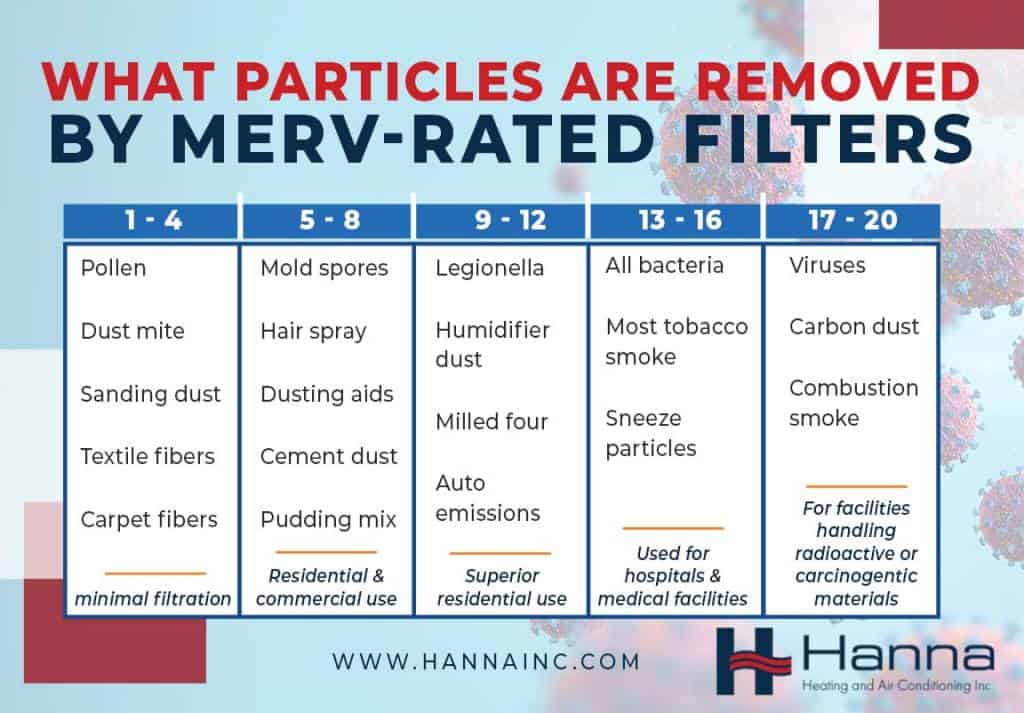

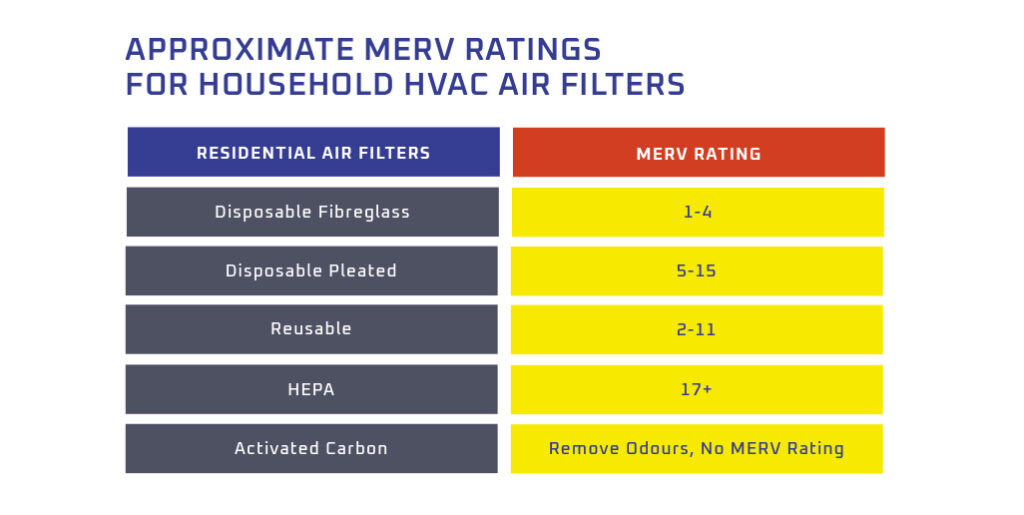
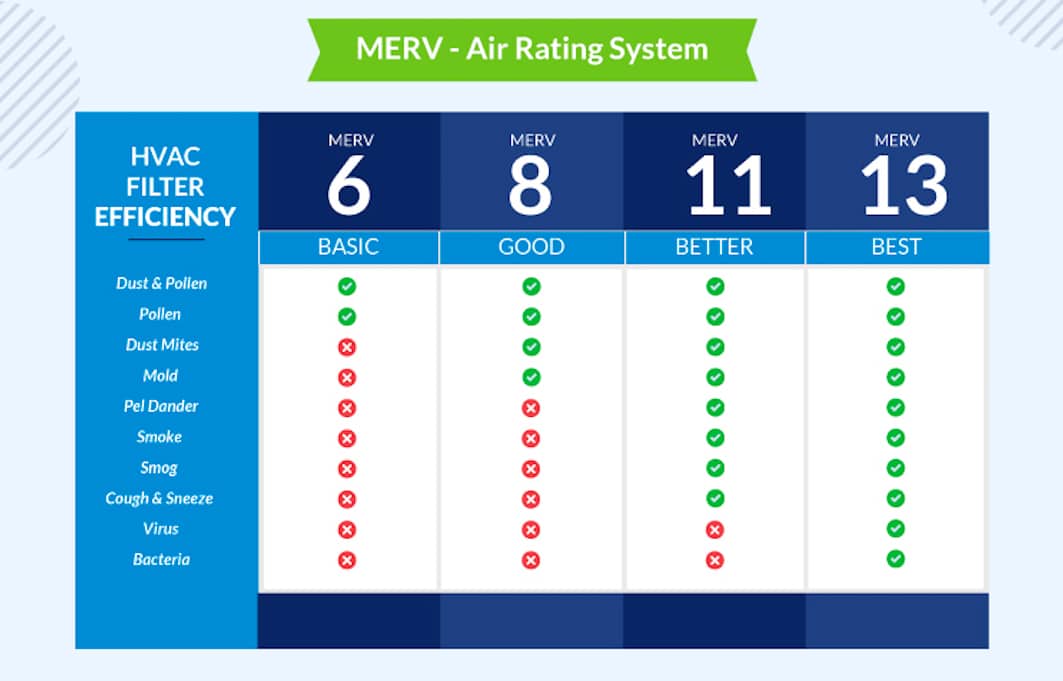

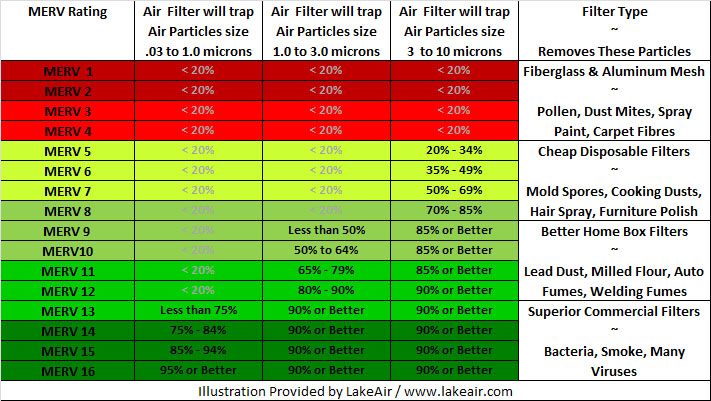
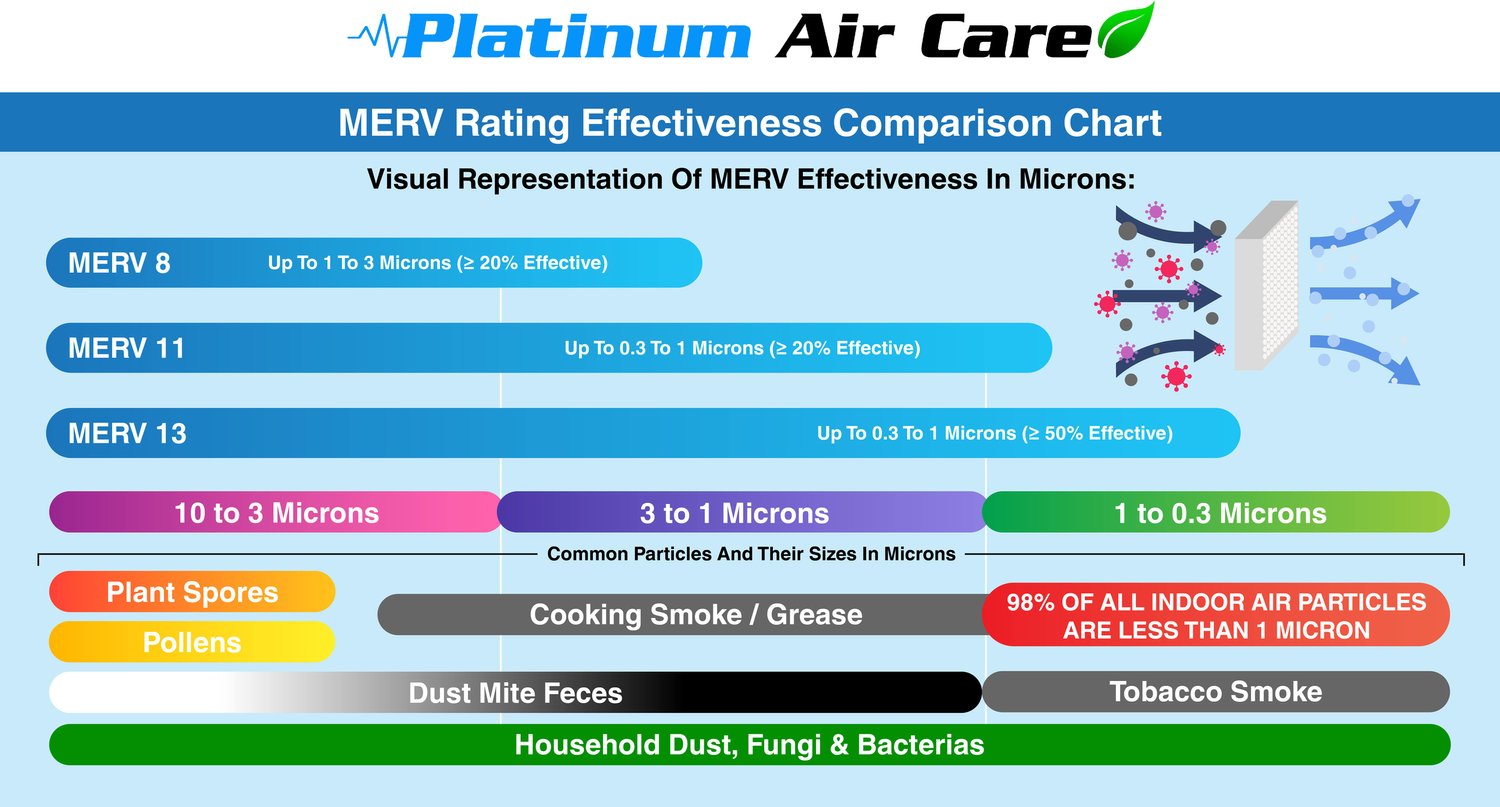


.png?width=820&height=462&name=MERV RATINGS (1).png)
